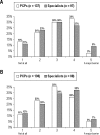(Mis) perceptions and interactions of sleep specialists and generalists: obstacles to referrals to sleep specialists and the multidisciplinary team management of sleep disorders
- PMID: 23243396
- PMCID: PMC3501659
- DOI: 10.5664/jcsm.2252
(Mis) perceptions and interactions of sleep specialists and generalists: obstacles to referrals to sleep specialists and the multidisciplinary team management of sleep disorders
Abstract
Study objectives: This study assessed generalists' perceptions and challenges in providing care to sleep disorders patients and the role of sleep specialists in improving gaps in care.
Methods: A mixed-method approach included qualitative (semi-structured interviews, discussion groups) and quantitative (online surveys) data collection techniques regarding care of patients with obstructive sleep apnea (OSA) and shift work disorder (SWD).
Participants: OSA: generalists n = 165, specialists (internists, neurologists, psychiatrists, pulmonologists) n = 12; SWD: generalists n = 216, specialists n = 108. Generalists reported challenges in assessing sleep disorders and diagnosing patients with sleep complaints. Generalists lacked confidence (selected ≤ 3 on a 5-pt Likert scale) in managing polypharmacy and drug interactions (OSA: 54.2%; SWD: 62.6%), addiction (OSA: 61.8%), and continuous positive airway pressure (OSA: 66.5%). Generalists in both studies reported deficits in knowledge of monitoring sleep disorders (OSA: 57.7%; SWD: 78.7%), rather relying on patients' subjective reports; 23% of SWD generalists did not identify SWD as a medical condition. Challenges to generalist-specialist collaboration were reported, with 66% of generalists and 68% of specialists in the SWD study reporting lack of coordination as a barrier. Generalists reported lack of consistency in sleep medicine and a perceived lack of value in consulting with sleep specialists.
Conclusions: Knowledge and attitudinal challenges were found in primary care of patients with sleep disorders. Sleep specialists need to clarify and educate practitioners regarding primary care's approach.
Figures
References
-
- Institute of Medicine of the National Academies. Washington: Institute of Medicine; 2006. [Accessed July 8, 2009]. Sleep Disorders and Sleep Deprivation: An Unmet Public Health Problem. Available at: http://www.iom.edu/CMS/3740/23160/33668.aspx. - PubMed
-
- Sleep in America National Sleep Foundation. Washington: National Sleep Foundation; 2008. [Accessed July 8, 2009]. Sleep in America Poll. Available at: http://www.sleepfoundation.org/site/c.huIXKjM0IxF/b.3933533/
-
- Hiestand DM, Goldman M, Phillips B. Prevalence of symptoms and risk of sleep apnea in the US population. Chest. 2006;130:780–6. - PubMed
-
- Michigan Lung and Critical Care Specialists. Michigan: Michigan Lung and Critical Care Specialists; [Accessed February 6, 2009]. Shift Work Sleep Disorder. Available at: http://omlcc.com/SWSD.html.
Publication types
MeSH terms
Grants and funding
LinkOut - more resources
Full Text Sources


